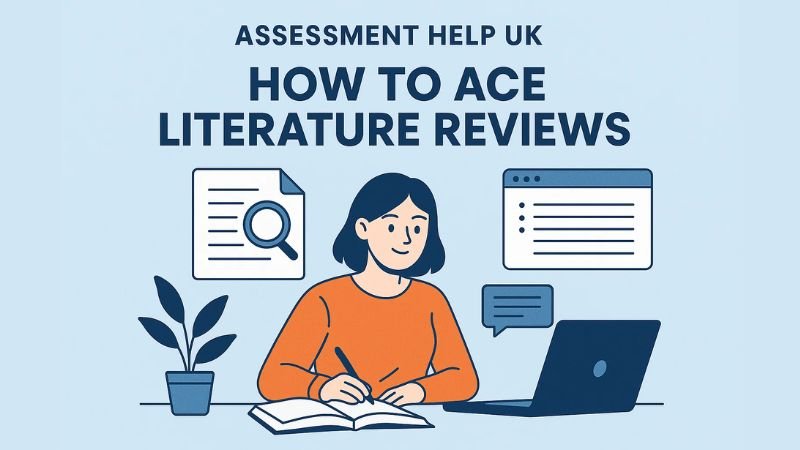Literature Review is one of the most common parts of educational assignments in UK universities yet. Whether you are writing a dissertation, thesis, or a standalone essay, your ability to be severely engaged with the existing scholarship often determines your grade. Many students, especially from academic conferences, find themselves overwhelmed and uncertain with the amount of research available to them how to give their writing structure.
This is the place where the assessment aid becomes priceless. By understanding the expectations of UK’s higher education and implementation of effective strategies, you can change literature reviews with a difficult task in the opportunity to show your analytical ability. In this article, we will find out the role of literature reviews, underlining a clear process for success, and will explain how evaluation support UK can give you a strong academic benefit.
What Is a Literature Review?
A literature review is not just a summary of books and articles. Instead, this is an important evaluation of existing research that highlights the major debate, gaps and trends in your subject field. Within UK universities, a strong literature review shows that you:
- Understand the research landscape – you know who are the main author and what their arguments are.
- Critically analyse sources – you do more than the description; You evaluate strength, weaknesses and relevance.
- Identify research gaps – You have been indicated while preparing the ground for your own research, which has not yet been discovered.
- Develop a structured narrative – You create a clear argument rather than presenting disconnected summary.
Finally, your literature review shows the candidates that you can keep your work within the conversation of comprehensive scholars.
Why Students Struggle with Literature Reviews in the UK
Despite their importance, literature reviews are often given status as one of the most difficult academic functions. Here are some common challenges faced by UK students:
- Overwhelming sources: With access to digital libraries such as JSSTOR and Google scholars, students often sink into information without knowing which sources are the most relevant.
- Lack of critical engagement: Many students present articles abbreviated instead of evaluating them. This decreases since the demand for assignment of the UK, not the details.
- Poor structure: A literature review without logical flow confuses the reader and weakens your argument.
- Referencing errors: UK universities are strict about referring to systems such as Harvard, APA, or MHRA, and may cause mistakes lost by mistakes.
- Time management: Balancing multiple assignments makes it difficult to dedicate the time required for research and writing.
These challenges are that so many learners search for Assessment Help UK Britain to refine their educational skills and produce high quality work.
Steps to Write an Effective Literature Review
1. Define Your Research Question
Before diving in sources, you should know what you are seeing. A literature review is only strong as its focus. Start by identifying your research objectives. For example:
- Instead of asking “What is climate change?” refine it to “How have UK policies addressed climate change between 2000–2020?”
This ensures that instead of being scattered instead of your reading, it remains purposeful.
2. Conduct a Systematic Search
Use your university library database, Google scholar and subject-specific magazines. To expand your search, make a list of relevant keywords and synonyms. For example, if research is done on “online learning”, you can also use “e-learning,” “digital education,” or “virtual classroom”.
Remember, effective search saves time and prevents you from remembering important studies.
3. Evaluate Sources Critically
Not all sources carry the same weight. In the UK Academia, a colleague reviewed magazine articles are often given more importance than blogs or old textbooks. When reviewing a study, ask yourself:
- What is the author’s main argument?
- What methodology did they use?
- What are the strengths and weaknesses?
- How does this connect with other sources?
This important mentality will help you avoid simple details and instead will engage in thoughtful analysis.
4. Organise by Themes, Not Sources
Many students have made a mistake that reviews chronologically (study by study). A strong approach is for group research by subjects or debates. For example, if you write about online learning, you can have subjects:
- Student engagement
- Technological barriers
- Teaching strategies
- Policy implications
This thematic structure creates a smoother narrative and demonstrates higher-level synthesis.
5. Develop a Clear Argument
Your literature review should not be a “list”. Instead, it should guide the reader towards understanding where your research fits. Use linking phrases such as:
- “In contrast to…”
- “Building on the work of…”
- “A limitation of this study is…”
This creates a coherent flow rather than a disconnected summary.
6. Reference Accurately
Accurate references are important in UK universities. Using assessment assistance services can follow your quotes and texts to follow the correct style (Harvard, APA, MHRA, or Chicago). Misconception can sometimes give rise to allegations of literary theft, so it matters accurately.
Practical Tips for UK Students
- Start early: Literature reviews often take longer than expected, so begin your reading well before the deadline.
- Use digital tools: Reference managers like Zotero, EndNote, or Mendeley can save hours when compiling bibliographies.
- Stay critical: Avoid accepting every source at face value; question assumptions and highlight limitations.
- Draft and revise: A good literature review requires multiple drafts to refine arguments and improve flow.
- Seek feedback: Tutors and writing centres can provide guidance on clarity and structure.
For many students, combining these strategies with professional Assessment Help UK ensures they not only meet but exceed academic expectations.
The Role of Assessment Help UK
Professional Assessment Help UK services are designed to support students at every stage of their academic journey. This does not mean outsourcing your work; rather, it means receiving expert guidance on how to improve your skills. Services may include:
- Research support: Helping you identify and select relevant sources.
- Structural advice: Suggesting ways to organise your literature review effectively.
- Critical analysis coaching: Teaching you how to evaluate sources, not just describe them.
- Editing and proofreading: Ensuring grammar, referencing, and academic tone meet UK university standards.
- Plagiarism checks: Making sure your work is original and properly referenced.
By seeking Assessment Help, you not only improve your current assignment but also build long-term academic confidence.
Why Literature Reviews Matter for Your Career
Many students see literature reviews as just another assignment, but they actually prepare you for future professional work. In a career such as research, policy making, or consultation, you will often need to evaluate the current information and present it clearly.
The skills you get – the synthesis of the virtuous thinking, the synthesis of complex data, the structured writing – are highly valued by employers in the UK job market. Thus, mastery in literature reviews is not only about achieving educational success, but also about the creation of transferable skills.
Conclusion
Literature Reviews are the foundation stone of academic works in Universities in Britain. They only require more than summarizing; They demand important thinking, structured writing and accurate references. For many students, it can feel heavy. This is why the assessment aid UK can create a real difference, offer guidance on research, structure and analysis.
By defining your question, by searching systematically, critically evaluating, and writing with a clear structure, you can turn a literature review into a display of your educational ability. Combined with professional assessment aid, you will be fully equipped to build your assignments and skills that will benefit you for a long time after the university.

